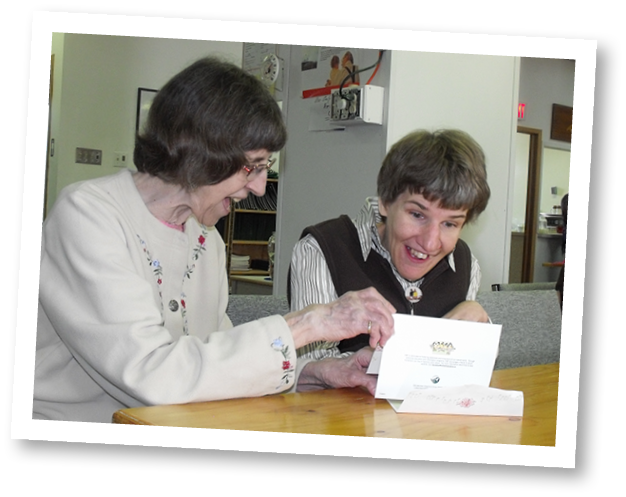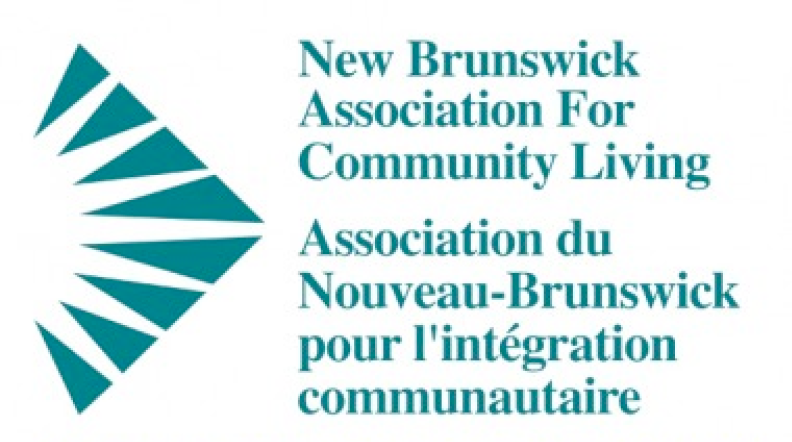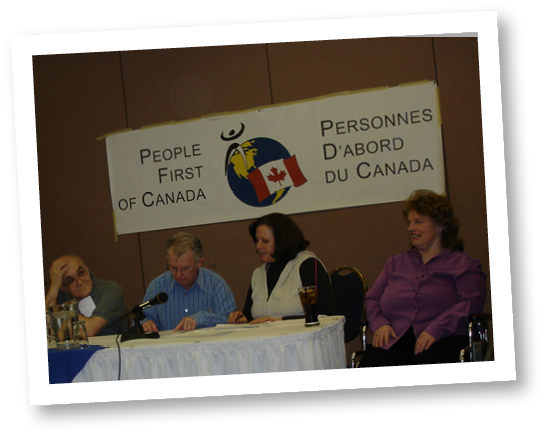Principle of Normalization
Past Presidents
1981-1983 Gordon Porter
1983-1985 Camille Ferguson
1985-1987 Nancy Amos
1987-1989 Tom Eno
1989-1990 Angelina Brideau Cool
Dr. Wolfensberger was an internationally renowned and often controversial scholar, activist and prolific author in the field of development disabilities. He was responsible for introducing two concepts which sought to change society’s perception of individuals with an intellectual disability.
Principle of Normalization: The adaptive participation of a devalued person in a culturally normative quantity of contacts, interactions and relationships with ordinary citizens, in normative activities and valued (or at least ordinary) physical and social settings.
Social role valorization: The use, as much as possible of culturally valued means to establish, enhance and or maintain valued social roles for people.
1981
INTERNATIONAL YEAR OF DISABLED PERSONS
In 1976, the General Assembly proclaimed 1981 as the International Year of Disabled Persons (IYDP)*. It called for a plan of action at the national, regional and international levels, with an emphasis on equalization of opportunities, rehabilitation and prevention of disabilities.
The theme of IYDP was “full participation and equality”, defined as the right of persons with disabilities to take part fully in the life and development of their societies, enjoy living conditions equal to those of other citizens, and have an equal share in improved conditions resulting from socio-economic development.
1982
25TH CAMR ANNIVERSARY CONFERENCE IN SAINT JOHN, NB
On May 29, 1982, at the 25th Annual Conference of the New Brunswick Division of the Canadian Association for the Mentally Retarded, then Premier Richard Hatfield stated that students with mental disabilities and those with special needs had a right to an education. And he promised that his government would integrate those students into the regular school system. This statement by the Premier came one year after the government launched a study of the Auxiliary Classes Act (1981), designed to provide for the education of all children with special needs in the least restrictive environment.
The first early intervention program in NB began in Fredericton under the auspices of the local association.
The provincial government later took over the early intervention program.
Flyer from 25th Anniversary Conference
Agenda from conference
In 1980, Lorraine Silliphant, the President of Canadian Association for the Mentally Retarded: New Brunswick Division, submitted a brief to the Special Joint Committee on the Constitution of Canada. The brief outlined CAMR-NB’s stance on including people with an intellectual disability within the list of persons against whom there may be no discrimination. At that time there was a risk of only people with a physical disability being considered within the Charter. In the end, the Charter included protection for people with an intellectual disability by stating
“Every individual is equal before and under the law and has the right to the equal protection and equal benefit of the law without discrimination and, in particular, without discrimination based on race, national or ethnic origin, colour, religion, sex, age or mental or physical disability.”
Below is the first page of the brief:
First page of brief from CAMR-NB to Special Joint Committee
CANADIAN CHARTER OF RIGHTS AND FREEDOMS
The Canadian Charter of Rights and Freedoms is a part of the Canadian Constitution, which is a set of laws containing the basic rules about how our country operates. The Charter was signed into law on April 17, 1982. Section 15 of the Charter makes it clear that every individual in Canada – regardless of race, religion, national or ethnic origin, colour, sex, age or physical or mental disability – is to be considered equal. This means that governments must not discriminate on any of these grounds in its laws or programs.
Myth: People with an intellectual disability are incapable of thinking or learning.
Fact: People that have an intellectual disability have different levels of functioning. Every individual has the ability to learn, some more easily than others. However all people should be encouraged and given the opportunity to learn.
1983
PUBLIC HEARINGS ON AUXILIARY CLASSES
From February to April 1983, the Department of Education sponsored public hearings on the Auxiliary Classes Act, and, in September 1983, the authors of the Correia-Goguen report recommended that the Schools Act and the Auxiliary Classes Act be amended, that a single statute govern special education programs and services, and that free school privileges be offered to all children.
NAME CHANGE
The process for the Association’s name change began at the AGM in 1983 and came to a head at the national meeting held in Saint John in October of 1984. A fierce struggle occurred when the name changed failed to get the 2/3 votes required to pass because it was one vote short. The Board president was then instructed to call a Special General Meeting to adopt a non-labelling name within 6 months. The meeting was held in Montreal in June of 1985 where, once again, the vote for the new name fell short by one vote. After much discussion, a second vote was held that resulted in the new name being passed.
After the name change was passed, the Board of Directors set up a special committee to develop a program of action that reflected the new name. The committee, chaired by Gordon Porter and supported mainly by staff member Diane Richler, became known as the Community Living 2000 Committee. The Committee’s report set out 7 key goals to be accomplished by the year 2000, which, at the time, was 14 years away. The report was passed at the AGM in Montreal in the fall of 1986, the same year that Gordon Porter was elected president. Implementing the 7 key goals identified in the report became the focus of the work completed during the three years of Gordon’s presidency.
1985
CLOSURE OF DR WILLIAM F. ROBERTS HOSPITAL SCHOOL
In 1985, the Dr. William F. Roberts Hospital School, an institution for children and youth, was closed. This was coupled with significant investments in community-based programs to support children with intellectual and other disabilities to live with their families or with foster/adoptive families. The Hospital School housed children who were wards of the province who had physical and mental disabilities. Neglect and abuse were staples of the institution.
Below is a short video of Irma and Peter Penner who were employed by the Association at the time of the closure of the Hospital School. In 1985 the Penners were employed by the Association. In the video, the Penners, who are parents themselves of a daughter with an intellectual disability, discuss the Association’s role in the closure of the institution and how they planned with youth and their families who were moving into community.
Myth: People with an intellectual disability do not have feelings or emotions.
Fact: People with an intellectual disability have feelings like any other person, although they may not be able to express them as well.
1986
BILL 85
On June 18, 1986, the New Brunswick Legislature passed Bill 85 amending the Schools Act and repealing the Auxiliary Classes Act. The revised Schools Act marked the launch of the inclusion movement, i.e., the full participation of all students in all aspects of school and community life, without regard to their disability or difficulty.
In a 2005 policy brief, NBACL outlined the importance of Bill 85,
“IN NEW BRUNSWICK, WE HAVE BENEFITED FROM A LEGACY OF DEDICATION TO INCLUSIONARY PRACTICES FOR THE PAST THREE DECADES. THIS BEGAN WITH GROUND-BREAKING LEGISLATION IN 1986 WITH BILL 85, WHICH SUPPORTED THE INTEGRATED LEARNING ENVIRONMENT WITHIN THE COMMUNITY SCHOOL AS THE PRIMARY EDUCATIONAL OPTION FOR ALL STUDENTS. OVER THE YEARS, NEW BRUNSWICK HAS BEEN A PIONEER IN THE POLITICAL AND EDUCATIONAL SUPPORT TO INCLUSIVE SCHOOLS, BUT THERE IS STILL MORE WORK TO DO.”
Dianne Cormier Northrup has for decades navigated the many challenges of ensuring her children receive the opportunities they richly deserve. As Robert and Lynn, pictured here, continue to live fulfilling lives, her family's story is further proof that inclusive and accessible communities are built one home at a time.
Read the story below
THE EVE CASE
The 1986 ‘Eve’ case, the Supreme Court of Canada upheld the right of people with an intellectual disabilities to physical integrity. The court unanimously rejected a mother’s claim to have her daughter, who had an intellectual disability, sterilized. This “was a landmark case which is influential in Canadian legal decisions involving proxy-consented, non-therapeutic medical procedures performed on people of diminished mental capacity.”
Additional Resources for Eve Case
http://www.cbc.ca/archives/entry/1986-court-says-no-to-forced-sterilization
Contraception or Eugenics? Sterilization and “Mental Retardation” in the 1970s and 1980s
Sterilization of the Mentally Retarded Adult: The Eve Case
COMMUNITY LIVING 2000
In 1986, the Canadian Association for Community Living adopted its Community Living 2000 framework which outlines a vision for the end of the century in which the lives of people with an intellectual disability will be characterized by citizenship, membership, and self-determination. A key priority of Community Living 2000 is the elimination of institutions.
1987
Name Change
Up until this point, the organization’s name had been the Canadian Association for the Mentally Retarded: New Brunswick Division. This name was negative and stigmatizing to many people who had an intellectual disability. The name changed to New Brunswick Association for Community Living to more clearly represent the goals people have for themselves.
1988
COMMITTEE TO IMPLEMENT SCHOOL INTEGRATION
Department of Education established an advisory committee on the implementation of school integration.
Myth: Individuals with an intellectual disability are eternally child-like.
Fact: All people grow, develop and mature with the right opportunities for such development. Research shows that a person’s behavior is strongly linked to others’ expectations of them. Thus, if treated as a child, any person is more likely to behave in a child-like manner.
1989
COMMITTEE REPORTS
Advisory committee was split in two; Anglophone and Francophone committees. Both reported to the Minister. In May New Brunswick Legislature referred the reports of the two subcommittees to the Special Committee on Social Policy Development for consideration and public input.
Myth: Individuals with complex disabilities require institutional care.
Fact: Individuals with complex disabilities have been able to live full and meaningful lives in community.
THE RIGHT TO A JOB
The self-advocacy organization, People First, launches a campaign entitled “Pre Means Never.” The focus of the organization becomes that people with an intellectual disability have the right to a job.
In Canada, the People First movement began in 1973 when Self Advocates came from all over North America to talk about their rights. For people with intellectual disabilities, their first issue was their right to live in the community – to get out of institutions. By 1974, the first People First Chapter was up and running in British Columbia. This first group was made up of men and women who lived in an institution and wanted to get out. They wanted to live in the community and have their voice, their choice, and their rights. For the next several years, People First groups began to form in provinces, territories, and communities across the country.
By the mid 1980s, there was a national office and a staff for what was then called the Self Advocacy Development Project. By the late 1980s, the official People First of Canada organization began. People First of Canada was incorporated on March 21, 1991.
People First is a movement and a message that is about change. It is about changing lives, opening minds, shifting attitudes, and increasing inclusive behavior. It is about giving people information, opportunity and support. It is about individuals and it is about society. It is about the changes we have made on so many levels.
Empowerment, inclusion, having a voice and making one’s own choice are some of the changes individuals see when they become involved in the People First movement. Through mentors, at gatherings, when talking about past successes, and when planning future activities, individuals see what they can do when they have support and when they work together. By supporting inclusion and becoming activists within the movement, individuals have seen their work result in changes in their own lives, in other’s lives, and in our society.













